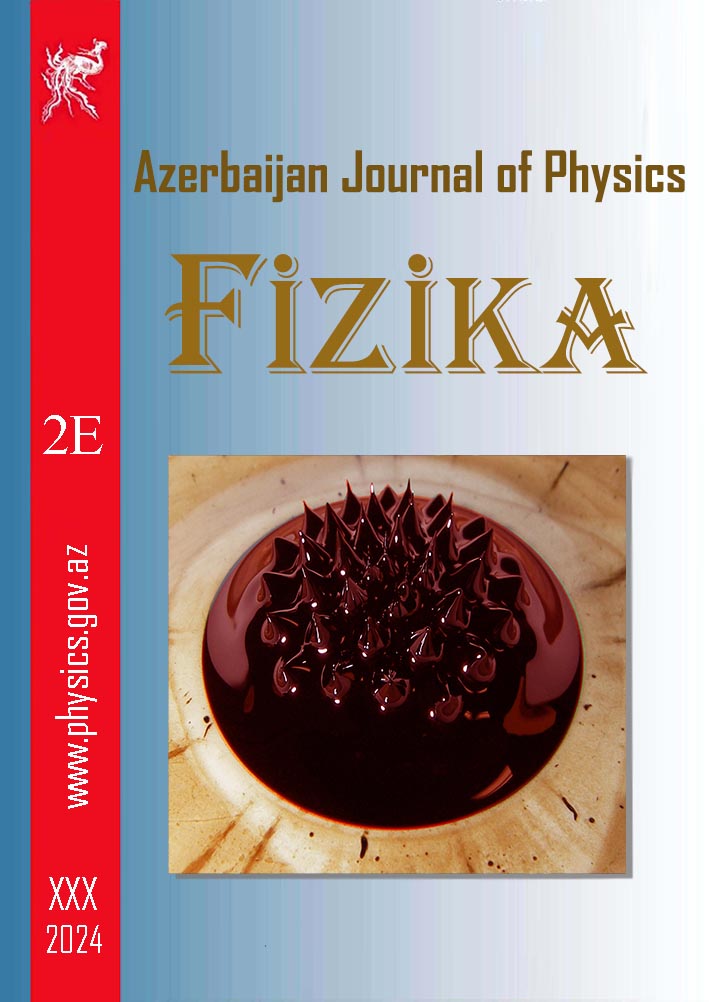ABSTRACT
The effect of posttreatment in a diluted HF solution on the photoluminescence spectra of stain etched porous silicon has been investigated. It is shown that this
posttreatment of as–prepared samples leads to a shift of the photoluminescence maximum from ~1.85eV to ~2.1eV. For posttreatment times less than 15min, subsequent
atmospheric oxidation displaces the photoluminescence maximum again to 1.85eV, exhibiting a full red–yellow–red cycle. For posttreatment times more than 15min, subsequent
atmospheric oxidation leads to photoluminescence quenching. The role of oxygen bonds in the observed phenomena is discussed.
Keywords: porous silicon; stain etching; posttreatment; diluted HF; yellow PL; oxygen bonds.
PACS: 81.40.−z; 78.67. Rb; 78.55.−m.
Received: 04.04.2022
AUTHORS & AFFILIATIONS
Condensed Matter Physics Division, Institute for Physical Problems, Baku State University, Baku AZ 1148, Azerbaijan
E-mail: farhad.rustamov@bsu.edu.az
|
REFERENCIES
[1] L.T. Chanham. Silicon quantum wire array fabrication by electrochemical and chemical dissolution of wafer, Appl. Phys. Lett. 1990, 57, pp. 1046-1048. https://doi.org/10.1063/1.103561
[2] V. Lehmann, U. Gosele. Porous silicon formation: A quantum wire effect, Appl. Phys. Lett. 1991, 58, pp. 856-858. https://doi.org/10.1063/1.104512
[3] C. Delerue, G. Allan, M. Lannoo. Theoretical aspects of the luminescence of porous silicon, Phys. Rev. 1993, B 48, 15, pp.11024-11036. https://doi.org/10.1103/PhysRevB.48.11024
[4] M.V. Wolkin, J. Jorne, P.M. Fauchet, G. Allan, C. Delerue. Electronic States and Luminescence in Porous Silicon Quantum Dots: The Role of Oxygen, Phys. Rev. Lett. 1999, 82, 1, pp. 197-200. https://doi.org/10.1103/PhysRevLett.82.197
[5] Md.N. Islam, Satyendra Kumar. Influence of surface states on the photoluminescence from silicon nanostructures, J. Appl. Phys. 2003, 93, 3, pp. 1753-1759. https://doi.org/10.1063/1.1535254
[6] V. Lehmann. Electrochemistry of Silicon. Willey VCH, New York, 2002.
[7] L.T. Chanham. Properties of porous silicon. EMIS Data Review Series No. 18, London, 1997.
[8] E. Kayahan. The role of surface oxidation on luminescence degradation of porous silicon, Appl. Surf. Sci. 2011, 257(9) , pp. 4311-4316. https://doi.org/10.1016/j.apsusc.2010.12.045
[9] N. Arad-Vosk, A. Sa’ar. Radiative and nonradiative relaxation phenomena in hydrogen- and oxygen-terminated porous silicon, Nanoscale Research Letters. 2014, 9, 47, pp. 1-6. https://doi.org/10.1186/1556-276X-9-47
[10] E. Galeazzo, A. Beltran, F.J. Ramirez-Fernandez. Natural Oxidation of Porous Silicon, Brazilian Journal of Physics, 1997, 27/ A, 4, pp. 170-172.
[11] S.M. Hossain, S. Chakraborty, S.K. Dutta, J. Das, H. Saha. Stability in photoluminescence of porous silicon, J. Lumin. 2000, 91, pp.195-202.https://doi.org/10.1016/S0022-2313(00)00225-8
[12] H. Koyama, N. Koshida. Photo-assisted tuning of luminescence from porous silicon. J. Appl. Phys. 1993, 74, pp. 6365-6367. https://doi.org/10.1063/1.355160
[13] B. Bessais, H. Ezzaouia, H. Elhouichet, M. Oueslati, R. Bennaceur. Correlation of photoluminescence spectra and structure of porous silicon. Semicond. Sci. Technol. 1996, 11, pp. 1815–1820.
[14] Y.Q. Jia, L.Z. Zhang, J.S. Fu, B.R. Zhang, J.C. Mao. Characterization of stain etched porous Si with photoluminescence, electron paramagnetic resonance, and infrared absorption spectroscopy, J. Appl. Phys. 1993, 74 (12), pp. 7615-7617. https://doi.org/10.1063/1.354940
[15] É. Vázsonyi, E. Szilágyi, P. Petrik, Z. Horvath, T. Lohner, M. Fried, G. Jalsovszky. Porous silicon formation by stain etching, Thin Solid Films. 2001, 388, pp. 295-302. https://doi.org/10.1016/S0040-6090(00)01816-2
[16] B. González-Díaz, R. Guerrero-Lemus, J. Méndez-Ramos, B. Díaz-Herreraa, V.D. Rodríguez. Gradual oxidation of stain etched porous silicon nanostructures applied to silicon-based solar cells. Sens. Actuators. 2009, A 150, pp. 97–101. https://doi.org/10.1016/j.sna.2008.12.006
[17] F.A. Rustamov, N.H. Darvishov, V.E. Bagiev, M.Z. Mamedov, G.M. Eyvazova, E.Y. Bobrova, H.O. Qafarova. Reversible quenching of photoluminescence in stain etched porous silicon at HNO3 posttreatment and role of oxygen bonds. J. Lumin. 2018,195, pp. 49-53. https://doi.org/10.1016/j.jlumin.2017.11.011
[18] F.A. Rustamov, N.H. Darvishov, M.Z. Mamedov, E.Y. Bobrova, H.O. Qafarova. Formation of lateral homogeneous stain etched porous silicon with acetic acid at oxidant insufficiency, Azerb. J. Physics. 2012, 18, 3, pp. 44-49. http://inis.iaea.org/search/search.aspx?orig_q=RN:44023241
[19] F.A. Rustamov, N.H. Darvishov, V.E. Bagiev, M.Z. Mamedov, E.Y. Bobrova, H.O. Qafarova. Determination of size and bandgap distributions of Si nanoparticles from photoluminescence excitation and emission spectra in n-type stain etched porous silicon, J. Lumin., 2014, 154, pp. 2024-2028. https://doi.org/10.1016/j.jlumin.2014.04.037
[20] G. Di. Francia, A. Citarella. Kinetic of the growth of chemically etched porous silicon. J. Appl. Phys. 1995, 77 (7), pp. 3549–3552. https://doi.org/10.1063/1.358585
[21] M.J. Winton, S.D. Russell, J.A. Wolk, R. Gronsky. Processing independent photoluminescence response of chemically etched porous silicon, Appl. Phys. Lett. 1996, 69, pp. 4026-4028. https://doi.org/10.1063/1.117859
[22] M. Nahidi, K.U. Kolasinski. Effects of stain etchant composition on the photoluminescence and morphology of porous silicon, J. Electrochem. Soc. 2006,153, 1, pp. C19-C26. https://doi.org/10.1149/1.2129558
|
